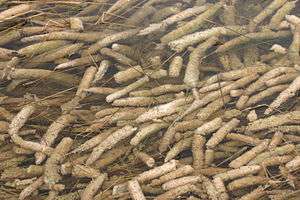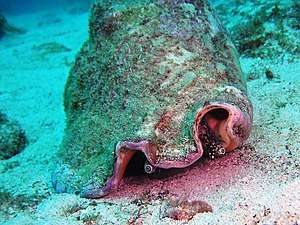Periphyton
Periphyton is a complex mixture of algae, cyanobacteria, heterotrophic microbes, and detritus that is attached to submerged surfaces in most aquatic ecosystems. The related term Aufwuchs (German "surface growth" or "overgrowth") refers to the collection of small animals and plants that adhere to open surfaces in aquatic environments, such as parts of rooted plants. Periphyton serves as an important food source for invertebrates, tadpoles, and some fish. It can also absorb contaminants, removing them from the water column and limiting their movement through the environment. The periphyton is also an important indicator of water quality; responses of this community to pollutants can be measured at a variety of scales representing physiological to community-level changes. Periphyton has often been used as an experimental system in, e.g., pollution-induced community tolerance studies.


In both marine and freshwater environments, algae – particularly green algae and diatoms – make up the dominant component of aufwuchs communities. Small crustaceans, rotifers, and protozoans are also commonly found in fresh water and the sea, but insect larvae, oligochaetes and tardigrades are peculiar to freshwater aufwuchs faunas.
Periphyton communities are used in aquaculture food production systems for the removal of solid and dissolved pollutants. Their performance in filtration is established and their application as aquacultural feed is being researched.
A risk for periphyton stems from urbanization. Increased turbidity levels associated with urban sprawl can smother periphyton causing its detachment from the rocks on which it lives. It can be important for the clearance of harmful chemicals and reducing turbidity.
Periphyton serves as an indicator of water quality[1] because:
- It has a naturally high number of species.
- It has a fast response to changes.
- It is easy to sample.
- It is known for tolerance/sensitivity to change.
Food source
Many aquatic animals feed extensively on aufwuchs. The mbuna cichlids from Lake Malawi are particularly well known examples of fish adapted for feeding on aufwuchs. Examples include Labeotropheus trewavasae and Pseudotropheus zebra. They have scraper-like teeth that allow them to rasp the aufwuchs from rocks.[2] In marine communities, aufwuchs food sources are important for animals such as limpets and sea urchins.
See also
References
- , EPA - Periphyton Protocols
- Aufwuchs
External links
- Marine Biological Laboratory Sustainable Aquaculture Initiative Developing plant-based fish diets and pond management protocols for the Comprehensive Development Project (CODEP) in L’Acul, Haiti
- Macrophyte and Periphyton lab
- Fishbase definition of aufwuchs